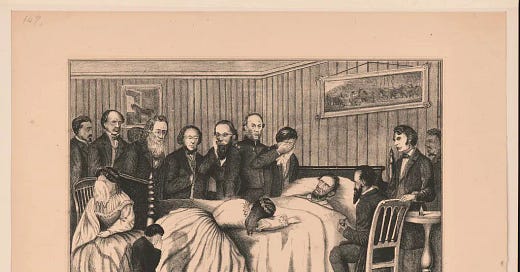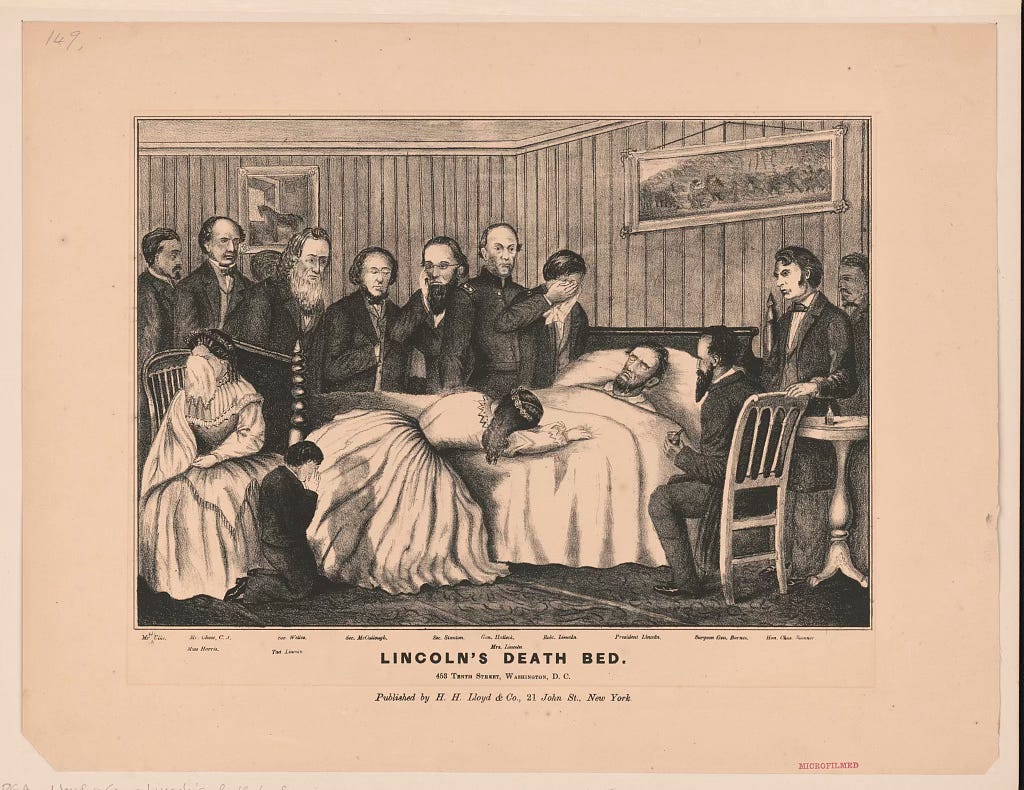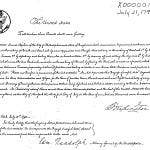This Day in Legal History: President Lincoln Dies
On this day in legal history, April 15, 1865, President Abraham Lincoln died from a gunshot wound inflicted the night before by actor and Confederate sympathizer John Wilkes Booth. The assassination occurred at Ford's Theatre in Washington, D.C., where Lincoln was watching a play with his wife. He was shot in the back of the head and never regained consciousness, dying the next morning at 7:22 a.m. His death was the first assassination of a U.S. president and triggered a constitutional transition of power during a critical moment in American history. Vice President Andrew Johnson was sworn in the same day, inheriting the enormous task of leading the country through the fragile early stages of Reconstruction.
Legally, Lincoln's assassination set several precedents. It led to the use of military tribunals to try civilians involved in Booth's conspiracy, a decision that remains controversial in constitutional law. The event also underscored the importance of presidential succession, later clarified by the 25th Amendment. In the immediate aftermath, martial law and curfews were imposed in the capital, and a massive manhunt ensued for Booth and his co-conspirators. The killing intensified public sentiment against the South and complicated efforts to reunify the nation. Johnson's approach to Reconstruction diverged sharply from Lincoln’s more conciliatory plans, shaping decades of legal and political conflict over civil rights. The assassination deeply impacted how the federal government approached both national security and executive protection. The tragedy marked not just the loss of a president, but a shift in the legal and political structure of post-Civil War America.
As Lincoln’s funeral train retraced the route that had carried him from obscurity in Illinois to the presidency, it served as a symbolic farewell to both the man and the future he might have shaped. Each stop along the way—cities draped in mourning, crowds in silent grief—marked not only the end of his political journey but also the shunting off of a potential trajectory for his second term. Had Lincoln lived, his vision for a more lenient and reconciliatory Reconstruction might have softened the bitter divisions that would later deepen under Andrew Johnson’s combative leadership. Perhaps civil rights protections would have been implemented sooner, with Lincoln using his political capital and moral authority to push for more lasting equality. The possibility remains that a different course could have been taken—one that prioritized unity without compromising justice, and that may have led to a more inclusive and less violent post-war America.
Kilmar Abrego Garcia, a legally residing Salvadoran migrant in Maryland with a U.S. work permit, was wrongly deported to El Salvador in March, despite a judge’s order blocking his removal. The Trump administration acknowledged the deportation was in error but has told a federal court it is not obligated to help him return from prison in El Salvador, interpreting a Supreme Court directive to "facilitate" his return as limited to removing domestic barriers—not assisting with his release abroad.
A U.S. District Court judge had ordered the government to bring him back, a decision the Supreme Court upheld by rejecting the administration’s appeal. However, a top immigration official has now argued the deportation order is moot, citing Abrego Garcia’s alleged ties to MS-13, a group newly designated as a foreign terrorist organization. The State Department has confirmed that Abrego Garcia is "alive and secure" in a terrorism detention facility in El Salvador. Legal efforts continue, with Abrego Garcia’s attorneys seeking more information from the government. The administration warns this could disrupt diplomatic talks, particularly with El Salvador’s President Nayib Bukele visiting Washington. President Trump has said his administration would comply if ordered directly by the Supreme Court.
Trump administration says it is not required to help wrongly deported man return to US | Reuters
Sandoz, a Swiss generic drugmaker, has filed a U.S. antitrust lawsuit against Amgen, accusing it of unlawfully maintaining a monopoly on its arthritis drug Enbrel. The lawsuit, filed in federal court in Norfolk, Virginia, alleges that Amgen created a "thicket of patents" to block the entry of biosimilar competitors like Sandoz's Erelzi, which has been approved by the FDA since 2016 but has not launched in the U.S. Sandoz claims this strategy has kept its lower-cost alternative off the market, depriving patients of affordable options and causing the company to lose millions in potential monthly sales. Amgen has not yet commented on the lawsuit. Enbrel generated $3.3 billion in U.S. revenue in 2024 alone and is used to treat inflammatory diseases such as rheumatoid arthritis. Sandoz argues that Amgen’s patent practices violate federal antitrust laws by suppressing competition and artificially extending its market dominance. The company is seeking an injunction to stop Amgen from using its patent portfolio in this way, as well as financial damages for lost sales.
Sandoz files U.S. antitrust lawsuit against Amgen over arthritis drug | Reuters
The U.S. Government Accountability Office (GAO) has agreed to investigate recent changes at the Securities and Exchange Commission (SEC), including those influenced by the White House and the Department of Government Efficiency (DGE), led by Elon Musk. This probe follows a request from Senators Elizabeth Warren and Mark Warner, who raised concerns about the SEC's ability to fulfill its regulatory duties amid sweeping restructuring efforts. Since President Trump’s return to office and the Republican takeover of the agency, the SEC has reduced staff, ended leases, and reorganized operations. It has also scaled back enforcement efforts and seen a wave of resignations as part of a broader federal downsizing initiative. The GAO confirmed that the request for an investigation falls within its authority, with the review expected to begin in about three months. Lawmakers stress the importance of understanding how these changes may be undermining the SEC’s mission. The agency’s funding, while approved by Congress, is sourced from transaction fees rather than taxpayer dollars. These developments coincide with market instability triggered by Trump’s recent tariff announcement.
US congressional watchdog to probe changes at the SEC, letter says | Reuters














Share this post